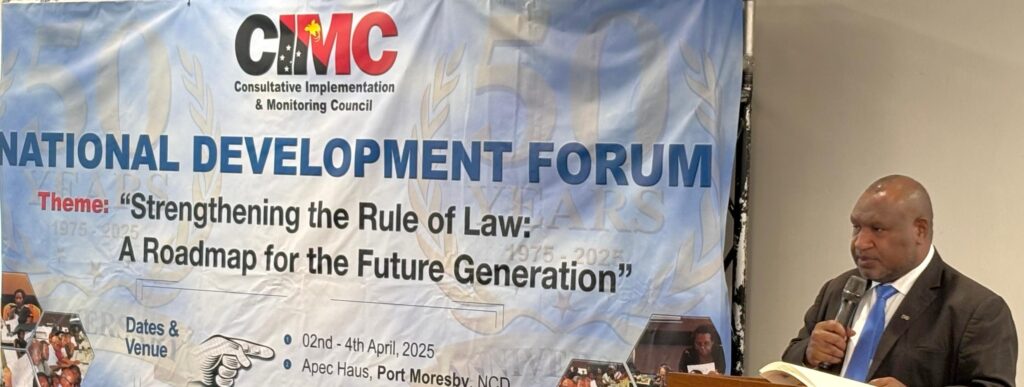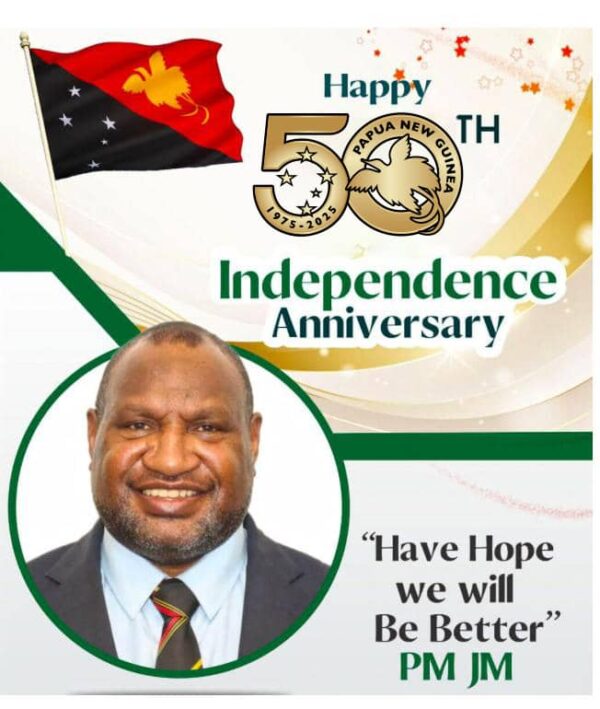Port Moresby, 2 April 2025 – Prime Minister Hon. James Marape today delivered a powerful keynote address at the 2025 National Development Forum, hosted by the Consultative Implementation and Monitoring Council (CIMC), where he laid out a bold vision for strengthening the rule of law and redefining national governance ahead of Papua New Guinea’s 50th year of Independence.
Held at APEC Haus, Port Moresby, under the theme “Strengthening the Rule of Law: A Roadmap for the Future Generation (1975–2025),” the forum brings together government, civil society, development partners, churches, academia, and the private sector for a critical national dialogue on PNG’s development trajectory.
Prime Minister Marape opened his remarks by honouring CIMC’s tireless work since 1998 in creating a space for meaningful public discourse.

“I want to place on record my deep appreciation to the CIMC for your consistent work since 1998. You represent the voice of all cross-sections of society—government, private sector, churches, civil society. That voice is worth hearing,” the Prime Minister said.
He recognised that many contributors to CIMC do so voluntarily, with passion and persistence, describing it as “not a full-time paid job for most, but a labour of love for the nation.”
With the country preparing to mark 50 years of nationhood on 16 September 2025, Prime Minister Marape emphasised that this is not merely a time for celebration but for reflection and action.
“As we mark our golden jubilee, it is important to look retrospectively—identify our weaknesses, celebrate our successes, and plan bold steps for a secure, unified, and prosperous future,” he said.
He linked the forum’s timing to this national milestone, urging that the outcomes feed directly into the Government’s legislative and policy reform agenda in the lead-up to 2025–2026.
The Prime Minister laid out five reform priorities that he sees as critical to securing the nation’s future:
- Education Reform: Instilling Lawfulness from Early Childhood
Prime Minister Marape highlighted education as the foundation of lawful living and national progress. He stressed the importance of reviewing the curriculum to instil values-based education from early childhood through tertiary levels.
“We must teach our children to respect the law, to be kind, tolerant, and accountable. Let us not adopt foreign worldviews that conflict with our cultural and moral fabric. Education is key to lawful citizenship.”
He called on the forum to make concrete recommendations on aligning education with national identity, lawfulness, and productivity.
- Judicial Independence and Reform: Strengthening the Rule of Law
Reiterating his Government’s commitment to judicial independence, Prime Minister Marape detailed recent reforms, including the establishment of an Appeals Court, the elevation of the Supreme Court, and enhanced capacity for district and village courts.
“We have one of the best Constitutions in the world. It embeds rule of law as a cornerstone of democracy. My Government has elevated the judiciary, but more must be done to protect it from political interference and ensure justice is accessible.”
He urged CIMC to review how judicial independence and functionality can be entrenched in law and policy.
- Anti-Corruption: Strengthening ICAC and Integrity Systems
Referring to his Government’s long-standing promise, Prime Minister Marape affirmed his personal commitment to making the Independent Commission Against Corruption (ICAC) fully functional.
“We passed the ICAC law in 2020, and it almost cost me my government. But I made a promise, and I intend to keep it. This forum must help us strengthen ICAC—not for officers to enrich themselves—but to hold the powerful to account.”
He also acknowledged efforts to embed anti-corruption leadership within the police, including through secondments of international officers to restore credibility and capacity.
- Community Responsibility and Lawful Living
The Prime Minister reminded all citizens of their collective duty to the nation, stressing that keeping the law is the simplest and most powerful act of patriotism.
“Keeping the law costs nothing. It’s the easiest and best contribution any citizen can make. Don’t expect the Government to do everything. Citizens must do their part by simply obeying the law.”
He encouraged the forum to define the roles of community, churches, police, and civil society in reinforcing law and order from the ground up.
- Legislative Modernisation and Digital Transformation
Highlighting that some national laws still date back to the 1950s, Prime Minister Marape urged a modernisation drive across the legislative framework, particularly in light of rapid digital transformation.
“We’re living in an ICT-driven world. Our laws must reflect the times—embrace digital courts, biometric IDs, surveillance, and modern penalties. Let’s look at Singapore: fines, technology, and strict enforcement have built a world-class society.”
He encouraged the forum to make recommendations on how technology can be used to strengthen governance, public service delivery, and law enforcement.
The Prime Minister also acknowledged the continued support of development partners such as the European Union, and reaffirmed the Government’s openness to international cooperation, including bringing in external police officers and judges to support fragile sectors.
As the forum proceeds over the next two days, Prime Minister Marape pledged full government support for its outcomes and encouraged Cabinet Ministers to attend and engage with recommendations directly.
“Let’s not just talk. Let’s act. The laws and reforms we shape over the next 12 months will define the next 50 years. My Government is ready to work with CIMC and the people of PNG to ensure our nation rises, united and just.”
ENDS
![]()

Pikinini Hela, very powerful Prime minister u traim dropim prices blog ol kaikai, mipla poor kisim bikpla bagarap stret lo kaikai prices, nogat wanpla pop cone bai kisim seat blog u until na unless u die.thanks Hela man.